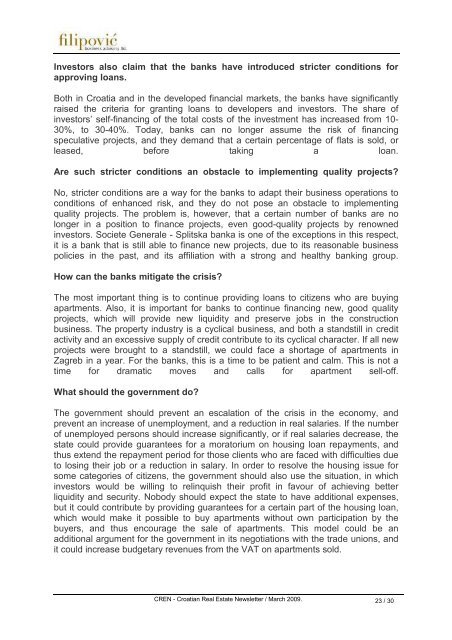- CREN - Croatian Real Estate Newsletter
- CREN - Croatian Real Estate Newsletter
- CREN - Croatian Real Estate Newsletter
You also want an ePaper? Increase the reach of your titles
YUMPU automatically turns print PDFs into web optimized ePapers that Google loves.
Investors also claim that the banks have introduced stricter conditions forapproving loans.Both in Croatia and in the developed financial markets, the banks have significantlyraised the criteria for granting loans to developers and investors. The share ofinvestors’ self-financing of the total costs of the investment has increased from 10-30%, to 30-40%. Today, banks can no longer assume the risk of financingspeculative projects, and they demand that a certain percentage of flats is sold, orleased, before taking a loan.Are such stricter conditions an obstacle to implementing quality projects?No, stricter conditions are a way for the banks to adapt their business operations toconditions of enhanced risk, and they do not pose an obstacle to implementingquality projects. The problem is, however, that a certain number of banks are nolonger in a position to finance projects, even good-quality projects by renownedinvestors. Societe Generale - Splitska banka is one of the exceptions in this respect,it is a bank that is still able to finance new projects, due to its reasonable businesspolicies in the past, and its affiliation with a strong and healthy banking group.How can the banks mitigate the crisis?The most important thing is to continue providing loans to citizens who are buyingapartments. Also, it is important for banks to continue financing new, good qualityprojects, which will provide new liquidity and preserve jobs in the constructionbusiness. The property industry is a cyclical business, and both a standstill in creditactivity and an excessive supply of credit contribute to its cyclical character. If all newprojects were brought to a standstill, we could face a shortage of apartments inZagreb in a year. For the banks, this is a time to be patient and calm. This is not atime for dramatic moves and calls for apartment sell-off.What should the government do?The government should prevent an escalation of the crisis in the economy, andprevent an increase of unemployment, and a reduction in real salaries. If the numberof unemployed persons should increase significantly, or if real salaries decrease, thestate could provide guarantees for a moratorium on housing loan repayments, andthus extend the repayment period for those clients who are faced with difficulties dueto losing their job or a reduction in salary. In order to resolve the housing issue forsome categories of citizens, the government should also use the situation, in whichinvestors would be willing to relinquish their profit in favour of achieving betterliquidity and security. Nobody should expect the state to have additional expenses,but it could contribute by providing guarantees for a certain part of the housing loan,which would make it possible to buy apartments without own participation by thebuyers, and thus encourage the sale of apartments. This model could be anadditional argument for the government in its negotiations with the trade unions, andit could increase budgetary revenues from the VAT on apartments sold.<strong>CREN</strong> - <strong>Croatian</strong> <strong>Real</strong> <strong>Estate</strong> <strong>Newsletter</strong> / March 2009. 23 / 30
















